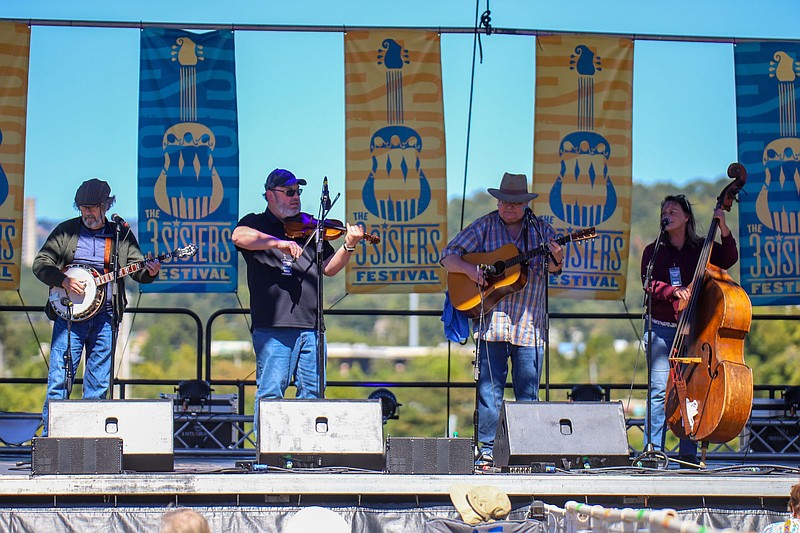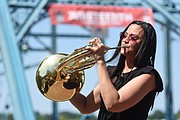The Chattanooga music scene has a lot going for it and a lot it can improve upon, according to a recent Chattanooga music census conducted by the Chattanooga Tourism Co. in conjunction with Sound Music Cities, a national company that works with the music industry and municipalities.
More than 1,400 people took the survey, more than any other census conducted by Sound Music, which has led similar surveys in places such as Nashville and Austin, Texas, according to founder and president Don Pitts.
It's roughly double the number of people who participated in a series of fact-gathering meetings held locally in 2013-14, and that fact alone is a big positive for SoundCorps Executive Director Stratton Tingle.
In an interview, he told the Chattanooga Times Free Press that the earlier informal survey was a benchmark and key for the creation of his nonprofit organization in 2015. SoundCorps is dedicated to enriching professionalism in the local music scene, and Tingle said this census is a new benchmark SoundCorps will use to evaluate how it has done and where it needs to go.
"These are the conversations that need to happen and haven't been," he later said by phone. "What are we going to work on? This is the beginning of the journey."
The census was funded by the Lyndhurst Foundation, which contributed $50,000 for the project. Kathleen Nolte, Lyndhurst program director for the arts and culture, said the survey was just part of the process.
"Now is when the rubber hits the road and the fun part begins," she said by phone.
She said she didn't feel like there were any surprises exposed by the data.
"The bigger theme is that the music ecosystem feels fragmented," she said. "That theme comes up over and over in various ways, and that is not surprising, but it helps us to pinpont what can we control, maybe."
The census was conducted online this past fall over several weeks and was open to anyone working in the music industry. That included musicians, teachers, stagehands and crew, producers, venue operators, managers and lawyers.
They were asked for opinions on things such as mental health, music career opportunities, income, housing, inclusion, diversity, equity and access to things like events and venues.
According to the responses:
-- 74% of respondents believe the city to be inclusive, while 26% found the "Chattanooga music ecosystem" to be racist.
-- 68% said it was not sexist, while 32% thought otherwise.
-- 72% said it was not homophobic, while 28% said it was.
-- 61% believed it to be non-ageist, while 39% believe ageism is an issue.
-- 54% said the industry is elitist, while 46% felt otherwise.
-- 81% said they feel safe in the area's music ecosystem, and 19% felt uncomfortable.
All of those categories are also broken down by a variety of demographics such as age, gender, race and role.
"We wanted to hear from everyone and anyone," said Donna Elle Harrison, director of cultural tourism and inclusive marketing with the Chattanooga Tourism Co.
She said the process now is to present the results to the more than 70 partners -- which include organizations such as ArtsBuild, Riverbend, Chattanooga Presents (Nightfall), the city and the Lyndhurst Foundation -- and to figure out what the next steps might be.
The Chattanooga Tourism Co. is also embarking on a similar census regarding local live music venues. It is designed to look at what is here and what might be needed. That data will be combined with the information gathered from the current census, Harrison said.
"We are creating a framework based on the four key takeaways that we think are important based on the data," Harrison said by phone from Texas, where she was attending the South by Southwest Conference & Festivals.
The four key takeaways, according to Harrison, are:
-- The parts are all here, but fragmentation limits Chattanooga's music ecosystem.
-- Music creatives need more pathways to sustainability.
-- Local music industry service providers are largely undiscovered by the creative community.
-- Chattanooga has diverse music venues and all are in need of additional resources and support.
The 2014 survey results called out the need to create an entertainment district, establish a city of Chattanooga entertainment office, create a Chattanooga resource center, develop a marketing plan and increase collaboration between the music sector and music education.
The more recent study finds some similarities in the earlier survey and also some deviations. Tingle said, for example, that SoundCorps in many ways fulfills that resource center need by offering workshops and seminars on things such as marketing and website design, but the original idea was to have a brick-and-mortar facility that would offer things like rehearsal spaces for musicians.
Pitts said by phone that such a space is expensive and not really what people say they want or need.
"It's more about human resources instead of throwing money at it," he said. "We've seen that if you try to help everybody, you help no one."
He said it's more about identifying the resources, and that usually means people -- and putting them together. For example, the survey found almost half of the respondents moved to Chattanooga within the past two years, and most of them had spent at least 10 years in the music industry.
"The people who have done it can help the ones who haven't," he said.
Getting them together in a positive environment where the veteran is willing to share his or her knowledge and the more inexperienced person is willing and open to learning is paramount.
Pitts mentioned Mike Dougher specifically as a local person with a wealth of knowledge about everything from running a club to booking bands to knowing where to set up concession or merchandise stations. For almost four decades, Dougher has done all that for venues such as Rhythm & Brews and Barrelhouse Ballroom and festivals such as Riverbend.
Dougher said by phone that if the customers are happy and able to spend money, they are more likely to and "everybody wins." He said he has worked with other venue owners and promoters many times over the years and will again if asked.
"I'm always happy to advise if they want advice," Dougher said. "I'm not the end-all on it. I just reach back on my experience. One thing I've always realized is to make it easy for the customer. Easy to get in, easy to get a drink and easy to find the bathroom.
"It's the same way with the acts," he said. "If you give them a good experience from when they get there to when they leave, they are happy and want to come back. It's a matter of putting the work in. People around me know if they put the work in, they're going to benefit."
Pitts said that kind of knowledge and experience is what others need the most, according to his reading of the census.
"If the right program can be built for him to participate, everyone would benefit," Pitts said. "People want to skip the infrastructure part, the blocking and the tackling, to use a sports metaphor. They want the Sportscenter highlight piece, but the details make the razzle-dazzle work."
Tingle agrees. On Thursday he was appearing before the Chattanooga Beer & Wrecker Board to get a temporary permit for a St. Patrick's Day party at Patten Square.
"I came here six years ago with Matt Lewis for the first time, and that is where I learned about applying for a beer permit," he said. "I didn't know I was learning at the time, but it's those kinds of things you have to learn about."
A big component of what Tingle and SoundCorps focus on is being professional. SoundCorps has hosted workshops and seminars on everything from how to put together an electronic press kit with a publicity photo and contact info to acting in a professional manner when playing a gig.
Pitts said those things are very important, but also that, according to the survey, not everyone plays music to make their living at it. When respondents say "music creatives need more pathways to sustainability," Pitts said "sustainability" doesn't necessarily mean making your living through music.
For example, 62% of respondents said they had more than 10 years of experience in the music industry, but among that group, 75% said they make most of their income outside the industry.
"Not everyone is in it to make a living or even money, but to sustain the ability to make money," he said.
One anonymous respondent said whatever money he or she makes through studio or recording work goes right back into things like equipment or studio rental.
Tingle said more work needs to be done to develop local audiences.
"I understand that the venue landscape is constantly changing and live gigs are important, but where are the audiences supporting it?" he said.
He said growing the local live music fan base is important and needs to be addressed, but Chattanooga needs to continue to attract out-of-town fans, something it has been doing fairly well in the past decade.
The Moon River Music Festival, which sold out in less than a week recently, for example, has drawn about 55% of its audience from outside the region, according to officials. Riverbend 2022 also reportedly drew fans from 44 states and six countries.
"That's why it is so great to have the Tourism Co. at the helm of this," Tingle said.
Contact Barry Courter at bcourter@timesfreepress.com or 423-757-6354.

